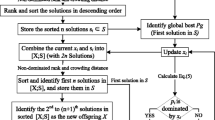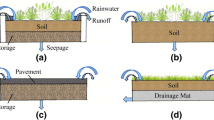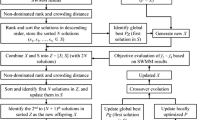Abstract
Design of detention tanks becomes important to the flooding control and drainage service management of an urban stormwater drainage system (USDS). While the hydrological and hydraulic models and methods have been widely developed in the literature for the optimal design and management of USDS, there is not yet a general methodological framework that is applicable for all practical systems. This is mainly because of various complexities in practical USDS, such as different design objectives (i.e., multi-objective design) and local design criteria and policies, as well as variety of inevitable uncertainties in the system. Previous work by the authors has focused on the first two aspects, in which a viable design framework has been developed and applied for multi-objective optimal design of detention tanks in the USDS under conditions of different local design criteria; and this paper deals with the third factor, aiming to explore and extend further the optimal design methodological framework to USDS with uncertainties. A real-life USDS in China is applied for this investigation. Uncertainty analysis is firstly conducted to characterize the importance of different uncertainty factors considered in the studied system. The uncertainty analysis result is thereafter incorporated into the previously developed multi-objective optimal design framework, in which the Monte-Carlo simulation method is adopted for the stochastic process investigation. The case application and analysis indicate different influences of uncertainty factors in the system to the multi-objective design results of detention tanks (total cost and flooding risk) in the studied USDS. The results and findings of this study are also discussed in the paper for their practical implications to the design and management of USDS.



Similar content being viewed by others
References
Ang H-S, Tang WH (1975) Probability concepts in engineering planning and design, volume II-decision, risk, and reliability. Wiley, New York
Ashley R, Blanksby J, Cashman A, Jack L, Wright G, Packman J, Fewtrell L, Poole T, Maksimovic C (2007) Adaptable urban drainage: addressing change in intensity, occurrence and uncertainty of stormwater (AUDACIOUS). Built Environ 33(1):70–84
Bennett MS, Mays LW (1985) Optimal design of detention and drainage channel systems. ASCE J Water Resour Plann Manage 111(1):99–112
CDOWE (Code for Design of Outdoor Wastewater Engineering) (2014) The People’s Republic of China Ministry of Housing and Urban Rural Development: 12–28
Chan K, Tam K, Leung Y (2010) Integrated planning and design of a flood relief project for sheung wan low-lying area. HKIE Civil Division Conference – Infrastructure Solutions for Tomorrow, 12–14 April 2010, Hong Kong
Chang C, Wen C, Lee C (2008) Use of intercepted runoff depth for stormwater runoff management in industrial parks in Taiwan. Water Resour Manage 22(11):1609–1623
Chen J, Li Q, Niu J, Sun L (2011) Regional climate change and local urbanization effects on weather variables in Southeast China. Stoch Env Res Risk A 25(4):555–565
Damodaram C, Giacomoni MH, Khedun CP et al (2010) Simulation of combined best management practices and low impact development for sustainable stormwater management. J Am Water Resour Assoc 46(5):907–918
Dong X, Chen J, Zeng S, Zhao D (2008) Integrated assessment of urban drainage system under the framework of uncertainty analysis. Water Sci Technol 57(8):1227–1234
Duan H-F, Tung YK, Ghidaoui MS (2010) Probabilistic analysis of transient design for water supply systems. ASCE J Water Resour Plann Manage 136(6):678–687
Ghosh S (2004) Dependence in stochastic simulation models. PhD Thesis, Cornell University, New York
Guo Y, Adams BJ (1999) An analytical probabilistic approach to sizing flood control detention facilities. Water Resour Res 35(8):2457–2468
Jeong J, Kannan N, Arnold J, Glick R, Gosselink L, Srinivasan R (2010) Development and integration of sub-hourly rainfall–runoff modeling capability within a watershed model. Water Resour Manag 24(15):4505–4527
Kleidorfer M (2009) Uncertain calibration of urban drainage models: a scientific approach to solve practical problems. PhD Dissertation, University of Innsbruck, Austria
Li F, Duan H-F, Yan HX, Tao T (2015) Multi-objective optimal design of detention tanks in the urban stormwater drainage system: framework development and case study. Water Resour Manag 29(7):2125–2137
Mays LW, Bedient PB (1982) Model for optimal size and location of detention. ASCE J Water Resour Plann Manage 108(3):270–285
Melching CS (1992) An improved first-order reliability approach for assessing uncertainties in hydrological modeling. J Hydrol 132:157–177
Obropta CC, Kardos JS (2007) Review of urban stormwater quality models: deterministic, stochastic, and hybrid approaches. J Am Water Resour Assoc 43:1508–1523
Ramos HM, Teyssier C, López-Jiménez PA (2013) Optimization of retention ponds to improve the drainage system elasticity for water-energy nexus. Water Resour Manag 27(8):2889–2901
Song X, Kong F, Zhan C, Han J (2012) Hybrid optimization rainfall-runoff simulation based on xinanjiang model and artificial neural network. J Hydrol Eng 17(9):1033–1041
Tao T, Xin K (2014) Public health: a sustainable plan for China’s drinking water. Nature 511:527–528
Tao T, Wang J, Xin K, Li S (2014) Multi-objective optimal layout of distributed storm-water detention. Int J Environ Sci Technol 11(5):1473–1480
Tung YK (1988) Multi-objective detention basin design in urban drainage systems – tradeoff between risk and cost. Water Resour Manag 2(1):57–62
Tung YK, Yen BC, Melching CS (2006) Hydrosystems engineering reliability assessment and risk analysis. McGraw-Hill Company, Inc., New York
Vojinovic Z, Sahlu S, Torres AS, Seyoum SD, Anvarifar F, Matungulu H, Barreto W, Savic D, Kapelan Z (2014) Multi-objective rehabilitation of urban drainage systems under uncertainties. J Hydroinf 16(5):1044–1061
Wang GQ (2012) Urban flooding disasters. Invited Talk for the Forum on the Urban Geo-Environment and Sustainable Development, 3–7 Dec. 2012, Hong Kong, China
Xu YP, Tung YK (2008) Decision-making in water management under uncertainty. Water Resour Manag 22(5):535–550
Zhang W, Li T (2015) The influence of objective function and acceptability threshold on uncertainty assessment of an urban drainage hydraulic model with generalized likelihood uncertainty estimation methodology. Water Resour Manag 29(6):2059–2072
Acknowledgments
This work was financially supported by the Hong Kong Polytechnic University (HKPU) under research projects 1-ZCVD, 1-ZVGF, G-YBC9 and G-YBHR. The authors also would like to thank Mr. TC Che in the research group at Hong Kong Polytechnic University for the help on Coding and sketching for this paper.
Author information
Authors and Affiliations
Corresponding author
Rights and permissions
About this article
Cite this article
Duan, HF., Li, F. & Tao, T. Multi-objective Optimal Design of Detention Tanks in the Urban Stormwater Drainage System: Uncertainty and Sensitivity Analysis. Water Resour Manage 30, 2213–2226 (2016). https://doi.org/10.1007/s11269-016-1282-1
Received:
Accepted:
Published:
Issue Date:
DOI: https://doi.org/10.1007/s11269-016-1282-1




